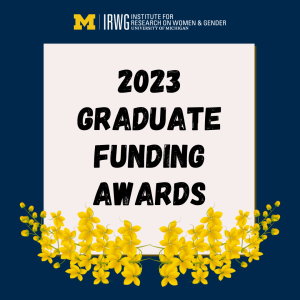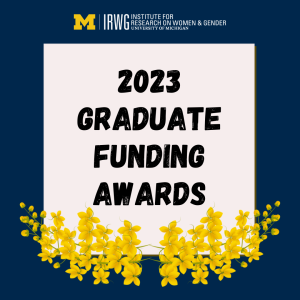2023 Graduate Student Research Awards


May 2023
The Institute for Research on Women and Gender has awarded 10 doctoral students summer funding to support wide-ranging projects related to women, gender, and sexuality.
Two Boyd/Williams Dissertation Grants were awarded for projects related to women and work. Through this award, IRWG supports projects that promote knowledge about and enhance understanding of the complexities of women’s roles in relation to their paid and unpaid labor. This prestigious dissertation fellowship is named for two sisters: Ruth Rodman Boyd (1892-1981), a longtime community activist, and Shirley Rodman Williams (1894-1999), who had a long career in the Detroit business community.
Eight IRWG/Rackham Community of Scholars summer fellowships were granted to PhD candidates from disciplines in the humanities and social sciences whose dissertations incorporate interdisciplinary feminist perspectives, or focus on women, gender, or sexuality. All awardees participate in a weekly interdisciplinary seminar during May and June, with time for individual research during July and August. The students were selected from a highly competitive pool. Their diverse set of projects demonstrates the scope of gender studies at U-M.
The 2023 Boyd/Williams Dissertation Grant recipients and their projects are:
Cassandra Euphrat Weston, PhD Candidate, History, College of LSA
“Sexual Dissidence, Jewishness, and American Radicalism, 1900-1930”
The sexual politics of American Jewishness between 1900-1930 shaped the long-term relationship between sexual dissidence and political radicalism in the United States. Weston considers “sexual dissidence” expansively, to refer to a broad range of sexual and reproductive activities, labor, ideas, and practices other than childbearing in a monogamous heterosexual marriage, including sex work. She first asserts that sexuality, migration, and radicalism collectively constituted American Jewishness as a contested category at the juncture of religion, ethnicity, and race, using Philadelphia, Butte, and San Francisco as case studies. The Boyd-Williams grant will allow Weston to complete research on the relationship among sexual dissidence, Jewishness, and radicalism in Butte, Montana, a case study that explores women and work in multiple ways. Most of this research will contribute to my chapter offering a social history of Jewish women's sexual dissidence in Butte, which will consider a range of forms of labor.
Jun Zhou, PhD Candidate, Sociology, College of LSA
“From Panopticon to Platform: Gender, Labor, and the Human-machine Reconfiguration in China”
The gendered labor process mediated by algorithms in the influencer industry in China is compared to that mediated by the older workplace technologies in factories. Specifically, Zhou examines how algorithms reconfigure human-machine relations on digital platforms through a novel method that she calls “carnal ethnography of algorithm,” which involves Zhou being an influencer to understand the gendered algorithmic control of the labor process and therefore what kinds of worker resistance are possible. This project will extend the frontier of scholarship on women and work in the age of digitalization.
IRWG / Rackham Community of Scholars Fellowship recipients and their projects are:
Brittany Joyce, PhD Candidate, History, College of LSA
“Slave Virgins and Freed Wives: The Control of Enslaved Sexuality through Virginity and Marriage”
Joyce studies the intersection of sexuality, slavery, and religion in the fourth and fifth centuries CE through enslaved women’s marriages and vows of virginity. Enslavers often contracted marriages with their freedwomen or had sexual relationships with enslaved women; they also dictated when these women made vows of virginity. Both practices illustrate how the institution of Roman slavery held power over sexuality, with some adaptation to Christian practice. With Christianity’s rising power during this period, religious practice became another means to control enslaved people. Joyce considers how religion and sexuality intersected with slavery to control enslaved women.
Jessica Kiebler, PhD Candidate, Psychology and Women's & Gender Studies, College of LSA
“Gender-Based Mistreatment of Black and White Lower-Income Women: The Role of Neoliberal Beliefs”
In one quantitative and one qualitative study, Kiebler examines the relationship between neoliberal beliefs and perceptions of gender-based mistreatment. In Study 1, she conducted two online surveys. Across the surveys, she assessed attitudes about gender-based mistreatment in relation to neoliberal beliefs and how neoliberal beliefs shape perceptions of lower-income white and Black women’s experiences of sexual assault. In Study 2, she conducted qualitative interviews with women living and working in precarious situations in southeast Michigan to assess how precarity might complicate experiences of mistreatment and perceptions of mistreatment among lower-income women.
Sunhong Kim, PhD Candidate, Musicology, School of Music, Theatre & Dance
“Sonic Hegemonic Masculinity in Piri/Taepyeongso Performance through Musical Training and Professional Practices in cis-heteropatriarchal South Korea”
Kim examines misogynistic practices in the musical training and the professional practices of piri (double-reed aerophone) and taepyeongso (conical reel aerophone), which are considered to be masculine instruments in Korea. She delves into pedagogical disciplines and presentations of “ideal sound” of these performances in relation to Korean masculine identity in musicianship. While Connell (2001) suggests the concept of “hegemonic masculinity” as a repetitive practice that legitimates men’s dominance over women, she argues that reproducing and passing on male-centered knowledge to female students through musical sound is a form of sonic hegemonic masculinity that impacts musical pedagogy and professional practices.
Raya Naamneh, PhD Candidate, Comparative Literature, College of LSA
“Eating Well and Making Kin: Food Relations with Animals”
Women, chickens, and cows’ relational care practices in food and foodways constitute their modes of being, while generating affective and embodied attachments of love and appreciation for the animals and their food. These care practices and the attachments they generate are grounds for a communal sensibility of relational abundance and gratitude for that which sustains (food, animals, land, and creator), within conditions of laborious living. While gendering of these care practices may disarticulate this sensibility’s radical potentialities, it remains generative of decolonial modes of relating, that unsettle ongoing settler-colonial relational alienation between land, animals, and people.
Sydney Tunstall, PhD Candidate, English and Women's & Gender Studies, College of LSA
“'Some Places Are Hard to Find': Black Lesbian Filmmakers and the Crisis of Documentation”
Two Black lesbian films, Cheryl Dunye’s pseudo-documentary The Watermelon Woman and Leilah Weinraub’s documentary Shakedown, are examined. Both filmmakers turn to the documentary genre to address the cultural crisis of “lost” or “absent” Black lesbian subcultures. Their attempts to recover these figures through the documentary process unearths a crisis at the level of form: the unavoidable fact that simply documenting their subjects’ existence cannot secure their material survival. Reckoning with this fact demands a kind of formal innovation from both filmmakers which, in turn, engenders new modes of engagement with the genre.
Raquel Vieira Parrine Sant'Ana, PhD Candidate, Romance Languages and Literatures, College of LSA
“"They Didn't See Her Running With Her Red Lips On Fire:" Politics and Desire in Leonilson's Visual Art”
During Brazil's democratic reopening, queer visual artist Leonilson (1957-1993) emerged in a movement of young artists hastily interpreted by critics as naïve, alienated, and representative of a time not constrained by state-sponsored censorship and persecution. While the end of three decades of the oppressive military regime had brought hope country-wide, a deep economic crisis and the repression of popular demonstrations indicated that the dark days were not completely over. Sant’Ana contends that Leonilson's work was not naïve, but resisted the lingering authoritarianism of his time through a novel aesthetic engagement between desire and politics.
Elizabeth Walz, PhD Candidate, Romance Languages & Literatures, College of LSA
“Regional Insubordination and Productive Disruption: Critical Feminist Contributions to Cultural Resistance in Peninsular and Caribbean Literature”
Walz explores Iberian Peninsular and Caribbean novels, essays, and archival materials featuring feminist participation in the disarticulation of the Spanish Empire and the rearticulation of Spanish hegemony during the 19th and 20th centuries. Engaging feminist and historical materialist theories of labor, race, and gender to interpret the multiples sites of violence encountered–physical, social, legal, and ideological–by women of different racial and social statuses, the project ultimately identifies the production of regional cultural resistances to the Spanish colonial-capitalist enterprise and situates discrete feminist interventions in emergent post-imperial nationalist projects as unique elements of a wider, shared cultural history.
Kerry White, PhD Candidate, American Culture, College of LSA
“Testimonios Trans: Narratives of Race, Sex, and Empire between Cuba and the United States”
White’s dissertation, Testimonios Trans, explores the testimonios or life stories of transgender people in Cuba and its diaspora. Drawing on ethnographic research and life history interviews, White examines how trans people make sense of their pasts, find survival strategies in the present, and perform different futures in the face of U.S. empire. Reflexively, White considers how the practice of testimonio may build trans solidarity across empire. As a fellow, White plans to draft a dissertation chapter on gender and sexual violence in narratives of trans life, situating violence against trans women as constitutive of gender and sexuality across the Americas.
